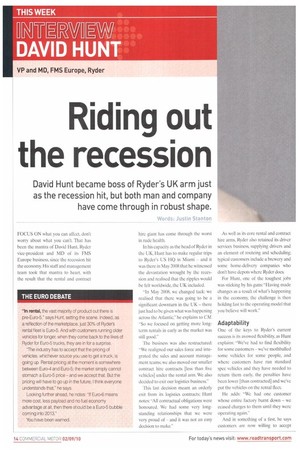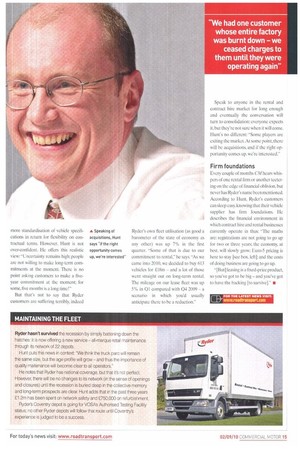Riding out the recession
Page 14

Page 15

If you've noticed an error in this article please click here to report it so we can fix it.
David Hunt became boss of Ryder's UK arm just as the recession hit, but both man and company have come through in robust shape.
Words: Justin Stanton
FOCUS ON what you can affect, don't worry about what you can't. That has been the mantra of David Hunt, Ryder vice-president and MD of its FMS Europe business, since the recession hit the economy. His staff and management team took that mantra to heart, with the result that the rental and contract hire giant has come through the worst in rude health.
In his capacity as the head of Ryder in the UK. Hunt has to make regular trips to Ryder's US HO in Miami — and it was there in May 2008 that he witnessed the devastation wrought by the recession and realised that the ripples would be felt worldwide, the UK included.
"In May 2008, we changed tack: we realised that there was going to be a significant downturn in the UK — there just had lobe given what was happening across the Atlantic," he explains to CM. -So we focused on getting more longterm rentals in early as the market was still good."
The business was also restructured: "We realigned our sales force and integrated the sales and account management teams; we also moved our smaller contract hire contracts [less than five vehicles] under the rental arm. We also decided to exit our logistics business."
This last decision meant an orderly exit from its logistics contracts: Hunt notes: "All contractual obligations were honoured. We had some very longstanding relationships that we were very proud of — and it was not an easy decision to make." As well as its core rental and contract hire arms. Ryder also retained its driver services business, supplying drivers and an element of routeing and scheduling; typical customers include a brewery and some home-delivery companies who don't have depots where Ryder does.
For Hunt, one of the toughest jobs was sticking by his guns: "Having made changes as a result of what's happening in the economy, the challenge is then holding fast to the operating model that you believe will work."
Adaptability
One of the keys to Ryder's current success is its avowed flexibility, as Hunt explains: "We've had to find flexibility for sonic customers — we've mothballed some vehicles for some people, and where customers have run standard spec vehicles and they have needed to return them early, the penalties have been lower [than contracted] and we've put the vehicles on the rental fleet.
He adds: "We had one customer whose entire factory burnt down — we ceased charges to them until they were operating again."
And in something of a first, he says customers are now willing to accept more standardisation of vehicle specifications in return for flexibility on contractual terms. However. Hunt is not over-confident. He offers this realistic view: "Uncertainty remains high; people are not willing to make long-term commitments at the moment. There is no point asking customers to make a fiveyear commitment at the moment; for some, five months is a long time!"
But that's not to say that Ryder customers are suffering terribly, indeed Ryder's own fleet utilisation (as good a barometer of the state of economy as any other) was up 7% in the first quarter. "Some of that is due to our commitment to rental," he says. "As we came into 2010, we decided to buy 613 vehicles for 118m — and a lot of those went straight out on long-term rental. The mileage on our lease fleet was up 5% in 01 compared with 04 2009 — a scenario in which you'd usually anticipate there lobe a reduction." Speak to anyone in the rental and contract hire market for long enough and eventually the conversation will turn to consolidation: everyone expects it, but they're not sure when it will come. Hunt's no different: "Some players are exiting the market. At some point, there will be acquisitions, and if the right opportunity comes up, we're interested."
Firm foundations
Every couple of months CM hears whispers of one rental firm or another teetering on the edge of financial oblivion, but never has Ryder's name been mentioned. According to Hunt, Ryder's customers can sleep easy, knowing that their vehicle supplier has firm foundations. He describes the financial environment in which contract hire and rental businesses currently operate in thus: "The maths are: registrations are not going to go up for two or three years; the economy, at best, will slowly grow; Euro-5 pricing is here to stay [see box, left]; and the costs of doing business are going to go up.
"IBut] leasing is a fixed-price product, so you've got to be big — and you've got to have the backing [to survive]." In
























































































































































































































































